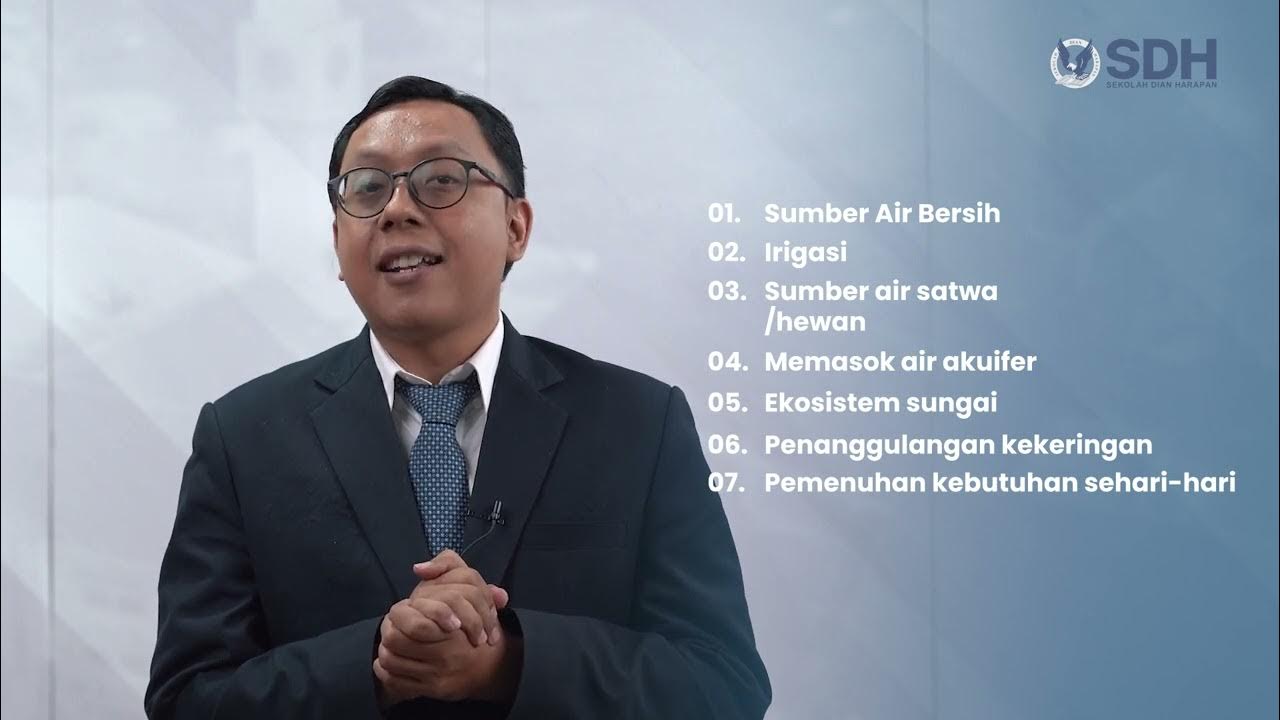What is ground contamination?
Summary
TLDRGroundwater, a vital resource for drinking and irrigation, faces significant threats from contamination by man-made substances like gasoline, oil, and chemicals. Natural soil constituents, pesticides, and pollutants from septic systems and petroleum storage contribute to this issue. Soil contamination not only affects biodiversity and filtration capabilities but also poses health risks. Preventative measures, including proper disposal of chemicals and monitoring of storage tanks, are crucial to avoid long-term environmental damage.
Takeaways
- 💧 Groundwater is a primary source of drinking water and irrigation in the U.S., but it is vulnerable to contamination.
- 🚫 Man-made substances such as gasoline, oil, salt, and chemicals can render groundwater unsuitable for human consumption.
- 🌱 Contamination can occur from materials dissolving in water from the soil, including sulfates, iron, radon, fluorides, manganese, chlorides, arsenic, and more.
- 🏠 In the U.S., 25% of homes rely on septic systems, which can be a significant source of groundwater pollution if not properly managed.
- 🛢️ Petroleum storage and transportation, including underground tanks and pipelines, pose a risk of groundwater contamination through leaks.
- 🚨 An estimated 16,000 chemical spills occur annually in the U.S., often due to transportation accidents, which can lead to groundwater pollution.
- 🌿 Soil contamination can harm the natural ecology, affecting soil biodiversity, organic matter levels, and the soil's ability to filter pollution.
- 🚫 Pollutants like pesticides, petroleum products, radon, asbestos, lead chromate, copper arsenate, and creosote are common in urban soils and contribute to contamination.
- 🌳 Soil pollution can add to air pollution through the emission of volatile compounds and lead to water pollution if chemicals drain into groundwater or surface water.
- 🤒 Health concerns arise from exposure to polluted soil, which can cause skin and eye irritation, headaches, nausea, and respiratory issues.
- 🛠️ Methods to remove toxic chemicals from the soil include bioremediation, chemical oxidation, soil stabilization, and proper utilization, storage, or disposal of hazardous compounds.
Q & A
What is the primary source of drinking water for more than half of the people in the United States?
-Groundwater is the primary source of drinking water for more than half of the people in the United States.
Why is groundwater considered vulnerable to contamination?
-Groundwater is vulnerable to contamination because man-made substances like gasoline, oil, salt, and chemicals can seep into it through the soil, rendering it unsuitable for human consumption.
What are some common contaminants that can affect groundwater sources?
-Common contaminants affecting groundwater sources include pesticides, fertilizers, toxic chemicals from mining sites, road salt, and spent motor oil.
How can soil and rock constituents contribute to groundwater contamination?
-Soil and rock constituents can dissolve in water and contaminate the environment, including sulfates, iron, radon, fluorides, manganese, chlorides, arsenic, and fluoride compounds.
What is the significance of septic systems in contributing to groundwater pollution?
-Septic systems are significant contributors to groundwater pollution because 25% of homes in the United States rely on them, and improper disposal can lead to the release of toxic organic gases like trichloroethane.
What are the environmental consequences of soil contamination?
-Soil contamination can harm the natural ecology, reduce soil biodiversity, diminish the soil's ability to filter pollution, and lead to an imbalance in soil nutrients.
How does soil pollution affect human health?
-Soil pollution can cause health concerns such as skin and eye irritation, headaches, nausea, vomiting, wheezing, coughing, and chest discomfort due to exposure to polluted soil.
What are some common pollutants found in urban soils?
-Common pollutants found in urban soils include pesticides, petroleum products, radon, asbestos, lead, chromate, copper, arsenate, and creosote.
How can soil contamination lead to water pollution?
-Soil contamination can lead to water pollution if harmful chemicals drain into groundwater or if polluted soil releases hazardous chemicals into adjoining ground or surface water.
What are some methods to prevent groundwater contamination?
-Prevention methods include not pouring chemicals on the ground, checking for leaks in underground oil storage tanks, proper disposal of garbage, ensuring wastewater drains correctly, eliminating floor drains if possible, and maintaining septic systems.
What strategies can be implemented to remove toxic chemicals from the soil?
-Strategies to remove toxic chemicals from the soil include bioremediation using microbes to decompose pollutants, chemical oxidation, and soil stabilization with immobilizing agents to reduce leeching.
Outlines

Esta sección está disponible solo para usuarios con suscripción. Por favor, mejora tu plan para acceder a esta parte.
Mejorar ahoraMindmap

Esta sección está disponible solo para usuarios con suscripción. Por favor, mejora tu plan para acceder a esta parte.
Mejorar ahoraKeywords

Esta sección está disponible solo para usuarios con suscripción. Por favor, mejora tu plan para acceder a esta parte.
Mejorar ahoraHighlights

Esta sección está disponible solo para usuarios con suscripción. Por favor, mejora tu plan para acceder a esta parte.
Mejorar ahoraTranscripts

Esta sección está disponible solo para usuarios con suscripción. Por favor, mejora tu plan para acceder a esta parte.
Mejorar ahoraVer Más Videos Relacionados
5.0 / 5 (0 votes)






